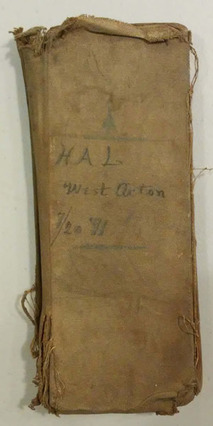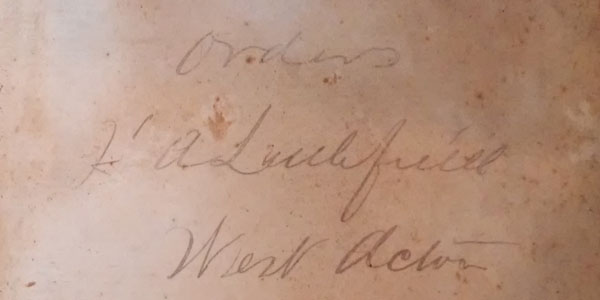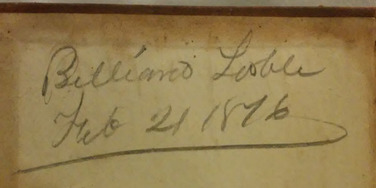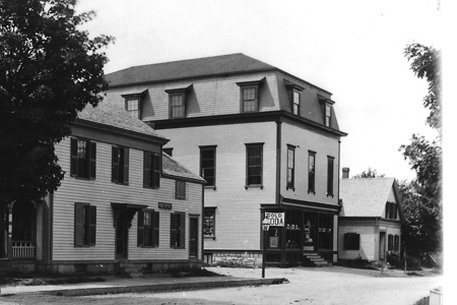|
We recently found a copy of an envelope advertising Littlefield’s ANTI-FLY, manufactured by H. A. Littlefield in West Acton, Mass. That name was too enticing to ignore, so we set out to learn more about the business. The envelope stated that Anti-Fly was a liquid concoction harmless to people and animals but discouraging to flies, roaches, ants, bed bugs and more. The enterprising Mr. Littlefield also stated that if there were insufficient postage on the envelope, it should be given to a Cattle Owner. An ad for the product appeared in the August 25, 1898 Concord Enterprise: “Stop the flies tormenting your horses and cows. Make $10.00 extra profit on each cow by using Littlefield’s Anti-Fly. Sold at all stores. If not send to H. A. Littlefield, Manfr, West Acton. 1 qt can, 50c; ½ gal, $1.00; 1 gal, $1.50; 5 gals, $5.00. Sprayer free with every can.” August 10, 1899 ads expanded: “Don’t Let Your Cows dry up during fly time. Anti-Fly keeps up full flow of milk.” and “Lice On Hens. Get rid of them. Use Anti-Fly freely about the roosts and in the nests.” By July 26, 1900, an ad cautioned "Anti-Fly is well known, sure, safe and economical. Don't be imposed upon with any cheap substitute, which in the end costs more and only results in disappointment." As it turns out, the Anti-Fly business had a lot of competition. Online newspapers show ads for other “anti-fly” products all over the country, at least back into the 1880s and on into the early twentieth century. How successful Littlefield’s product was, we aren’t sure. Phalen’s History of the Town of Acton says that the product had an “extensive market both in this country and abroad.” That may have been the case, but we found no newspaper mention of his product outside of the local area, or even locally beyond the 1898-1900 period. We did learn, however, that H. A. Littlefield was a very busy man. Anti-Fly seems only to have been a small part of his business life. Hanson A. Littlefield was born in Boxborough in 1848 to Jacob and Ann Brooks (Raymond) Littlefield. After his marriage in 1869 to Florence M. Preston, he moved to West Acton. His occupation was given as a carpenter in the 1870 Census, a wheelwright in his son Sheldon’s 1878 birth record, and a real estate agent in the 1880 Census. Concord Enterprise ads show that he also worked as an auctioneer. According to Phalen’s History, Hanson Littlefield invented cider jelly and had a business called the Littlefield and Robinson Cider Jelly Manufacturing Company that he sold to his partner in roughly 1884. The Cider Jelly Mill owned by Charles Robinson is documented (on a Walker’s Middlesex County Land Ownership map from 1889 and in Boston Globe and Concord Enterprise newspaper articles), but it seems unlikely that Mr. Littlefield was the inventor of cider jelly. Various unsourced websites indicate that boiled cider (thickened to a syrup) and cider jelly were commonplace in New England. Online searching led to an article in an 1865 journal complaining about an attempt to patent the process of evaporation to make cider jelly. “… we received from Messrs. Corey & Sons, Lima Ind., a very fine sample of cider jelly. It had been made on Cook’s Sorgo Evaporator with Corey’s improvements. … these gentlemen are not the inventors of cider jelly by evaporation. We ate it years before they obtained their patent.” (Sorgo Journal and Farm Machinist, Volume III. Cincinnati, Ohio: Clark Sorgo Machine Company, 1865, page 86). Gail Borden (of New York, inventor of condensed milk) also mentioned the concentration of cider down to a jelly in applying for a patent on his process (#35,919, July 22, 1862). During the time period when Hanson Littlefield’s jelly business might have been in operation, references to cider jelly appeared in newspapers as far away as Iowa. Clearly, Hanson Littlefield did not invent cider jelly, and we did not find any indication that he received a patent for improving the cider jelly-making process. He seems to have moved on to other ventures. The Society has a collection of business records that belonged to Hanson Littlefield that do not even touch on his Anti-Fly and Cider Jelly businesses. Among the records is a promissory note for a billiard table that he purchased on February 21, 1876 and an account book relating to expenses and revenues for a “room.” Entries in the book for various customers detailing billiards, pool, and tobacco indicate that one of his early commercial ventures was running a pool hall. (Cards and dice occasionally appear as well.) The most well-documented of H. A. Littlefield’s enterprises was his store in West Acton. The Society has some of his account books, mostly from the 1880s and 1890s. Those books, Acton town reports, and ads in the Enterprise show that he sold a broad array of items; coffee, tea, baking supplies, spices, fish, fruit, tubs of Vermont butter, canned goods, tobacco, screens, lamp parts and oil, tinware, paints, shellacs, seeds, farming tools, carpets, brooms, horse halters and reins, shirt waists, overalls, corsets, pantaloons, shoes, boots, baseballs and bats, toys, cloth, bluine powder for laundry, dyes, diaries, witch hazel salve, a “One minute Cough Cure”, and even a lot of 300 empty barrels.
One of Littlefield's many ads (Concord Enterprise, May 27, 1892) told potential customers that “We have a fresh, clean lot of groceries and other goods neither flavored with smoke or dirty water, at the lowest possible prices. Buy at home and get good goods, save time and money.” (One has to wonder which competitor’s merchandise he was comparing his own against.) Business was presumably good. Around 1893, Littlefield built a large hall in West Acton where meetings, dances, lectures, and basketball games were held. The store was evidently on the bottom floor, a large community meeting space was above that, and the top floor was the home of the Odd Fellows, of which Littlefield was a member. Hanson Littlefield was elected as an Acton selectman in 1893 and 1903. He was a notary and a justice of the peace, served as animal inspector according to a Concord Enterprise article (May 27, 1892), and was a member of a committee that looked into the town water supply in 1895. He was an active Democrat repeatedly elected to Democratic committee positions. He was appointed as postmaster in West Acton twice, first in 1886 and again in 1893, both times under Democratic president Grover Cleveland. At the time, the position was granted politically and often involved moving the post office to the place of business of the postmaster, undoubtedly bringing more customers into the store. Littlefield was also active in various local organizations, among them the Odd Fellows and the Grange. He and his wife raised a family of seven children. Given his obvious abundant energy and activity, it is amazing to read in his Boston Sunday Globe obituary (Aug 3, 1903, page 2) that Littlefield had been “an invalid for a long time, and had been a great sufferer.” He died on July 28, 1903, his doctor stating that the cause was cancer of a year’s duration. According to the Concord Enterprise (August 5, 1903), business was suspended in West Acton to allow townspeople to attend his funeral. He was buried at Mount Hope Cemetery. Hanson Littlefield was spared having to see his Hall completely destroyed by fire the next year, taking with it the grocery of his successor and all of the Acton Odd Fellows’ records, furnishings, and fraternal items. Given the proximity of the Hall to other buildings, the fire was expected to spread. Other towns’ firefighters had been summoned and were preparing to come to help when news was sent out that the blaze had been brought under control by the Acton firefighters. (The October 29, 1904 Fitchburg Sentinel mentioned that its local firefighters were a bit disappointed not to be able to take their “wild morning ride” by train to join in the fight.) The Odd Fellows Hall was rebuilt in the same location where it can still be seen at the corner of Central and Arlington Streets. Pictures of Littlefield’s Hall seem to be very rare, but we were delighted to find that Eugene L. Hall, whose photographic glass plates were donated to the Society, took two pictures of Littlefield Hall before it burned. Comments are closed.
|
Acton Historical Society
Discoveries, stories, and a few mysteries from our society's archives. CategoriesAll Acton Town History Arts Business & Industry Family History Items In Collection Military & Veteran Photographs Recreation & Clubs Schools |
Quick Links
|
Open Hours
Jenks Library:
Please contact us for an appointment or to ask your research questions. Hosmer House Museum: Open for special events. |
Contact
|
Copyright © 2024 Acton Historical Society, All Rights Reserved




 RSS Feed
RSS Feed